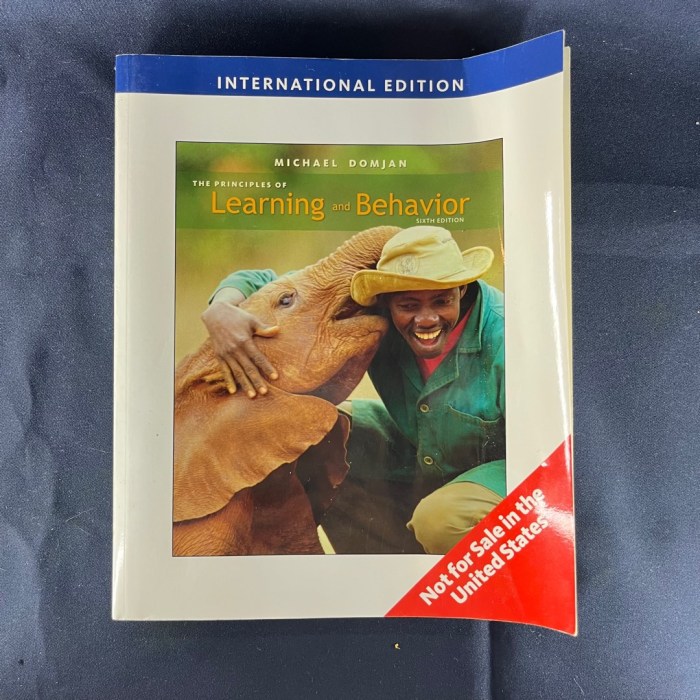Michael domjan the principles of learning and behavior – Michael Domjan’s groundbreaking contributions to the field of learning and behavior have shaped our understanding of how organisms acquire and modify behavior. His principles have influenced modern theories of learning and continue to guide practical applications in diverse fields.
Domjan’s work has illuminated the fundamental principles of associative learning, including classical conditioning and operant conditioning. His experiments and theories have provided insights into how stimuli and consequences shape behavior, influencing learning processes and shaping our interactions with the environment.
Michael Domjan’s Contributions to the Field of Learning and Behavior

Michael Domjan, a renowned psychologist, made significant contributions to the field of learning and behavior. His research focused on associative learning, particularly classical conditioning and operant conditioning.
Domjan’s Experiments and Theories on Classical Conditioning
Domjan’s experiments on classical conditioning demonstrated the role of temporal contiguity in establishing conditioned responses. He showed that the closer the conditioned stimulus (CS) was paired with the unconditioned stimulus (US), the stronger the conditioned response (CR) became.
Domjan’s Experiments and Theories on Operant Conditioning
Domjan’s work on operant conditioning expanded our understanding of reinforcement and punishment. He showed that the immediate consequences of behavior influence the likelihood of that behavior being repeated or suppressed.
Key Principles of Learning and Behavior

Domjan’s research led to the development of several key principles of learning and behavior:
Reinforcement, Michael domjan the principles of learning and behavior
- Positive reinforcement: Increasing the likelihood of a behavior by presenting a desirable consequence.
- Negative reinforcement: Increasing the likelihood of a behavior by removing an undesirable consequence.
Punishment
- Positive punishment: Decreasing the likelihood of a behavior by presenting an undesirable consequence.
- Negative punishment: Decreasing the likelihood of a behavior by removing a desirable consequence.
Extinction
The gradual weakening and eventual disappearance of a conditioned response when the CS is no longer paired with the US or when the behavior is no longer reinforced.
Applications of Domjan’s Principles: Michael Domjan The Principles Of Learning And Behavior

Domjan’s principles have found practical applications in various fields:
Education
- Using reinforcement to motivate students.
- Applying punishment to discourage disruptive behavior.
Animal Training
- Rewarding animals for desired behaviors.
- Punishing animals for undesirable behaviors.
Therapy
- Using reinforcement to encourage positive behaviors in individuals with developmental disabilities.
- Applying extinction to reduce maladaptive behaviors.
Contemporary Perspectives on Domjan’s Work
Domjan’s research has had a lasting impact on modern theories of learning and behavior:
Influence on Modern Theories
Domjan’s principles continue to inform current approaches to understanding and modifying behavior. His work has helped shape our understanding of the role of reinforcement, punishment, and extinction in learning.
Continuing Relevance
Domjan’s principles remain relevant in contemporary research and applications. They provide a framework for understanding and modifying behavior in a variety of settings.
Q&A
What are the key principles of Michael Domjan’s theory of learning?
Domjan’s principles include reinforcement, punishment, and extinction. Reinforcement strengthens behavior, punishment weakens behavior, and extinction occurs when a behavior is no longer reinforced.
How have Domjan’s principles influenced modern approaches to understanding behavior?
Domjan’s work has emphasized the importance of associative learning in shaping behavior. His principles have influenced cognitive and behavioral therapies, which aim to modify maladaptive behaviors by altering their associations with stimuli and consequences.